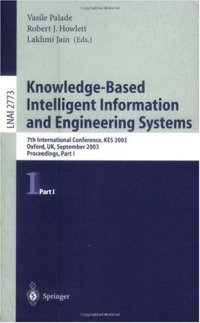
Ebook: Knowledge-Based Intelligent Information and Engineering Systems: 7th INternational Conference, KES 2003, Oxford, UK, September 2003. Proceedings, Part I.
- Genre: Education
- Tags: Artificial Intelligence (incl. Robotics), Computer Communication Networks, Information Storage and Retrieval, Information Systems Applications (incl. Internet), User Interfaces and Human Computer Interaction, Business Information Systems
- Series: Lecture Notes in Computer Science 2773 : Lecture Notes in Artificial Intelligence
- Year: 2003
- Publisher: Springer-Verlag Berlin Heidelberg
- Edition: 1
- Language: English
- pdf
2.1 Text Summarization “Text summarization is the process of distilling the most important information from a source (or sources) to produce an abridged version for a particular user (or users) and task (or tasks)” [3]. Basic and classical articles in text summarization appear in “Advances in automatic text summarization” [3]. A literature survey on information extraction and text summarization is given by Zechner [7]. In general, the process of automatic text summarization is divided into three stages: (1) analysis of the given text, (2) summarization of the text, (3) presentation of the summary in a suitable output form. Titles, abstracts and keywords are the most common summaries in Academic papers. Usually, the title, the abstract and the keywords are the first, second, and third parts of an Academic paper, respectively. The title usually describes the main issue discussed in the study and the abstract presents the reader a short description of the background, the study and its results. A keyword is either a single word (unigram), e.g.: ‘learning', or a collocation, which means a group of two or more words, representing an important concept, e.g.: ‘machine learning', ‘natural language processing'. Retrieving collocations from text was examined by Smadja [5] and automatic extraction of collocations was examined by Kita et al. [1].
The two volumes LNAI 2773 and LNAI 2774 constitute the refereed proceedings of the 7th International Conference on Knowledge-Based Intelligent Information and Engineering Systems, KES 2003, held in Oxford, UK in September 2003. The 390 revised papers and poster papers presented were carefully reviewed and selected from numerous submissions. Among the areas covered are knowledge-based systems, neural computing, fuzzy logic, uncertainty, machine learning, soft computing, agent systems, intelligent agents, data mining, knowledge discovery, hybrid intelligent systems, natural language processing, information retrieval, Web applications, case-based reasoning, evolutionary computing, signal processing, ontologies, decision making, human-computer interaction, intelligent user interfaces, neuroscience, intelligent agents, biocomputing, etc.